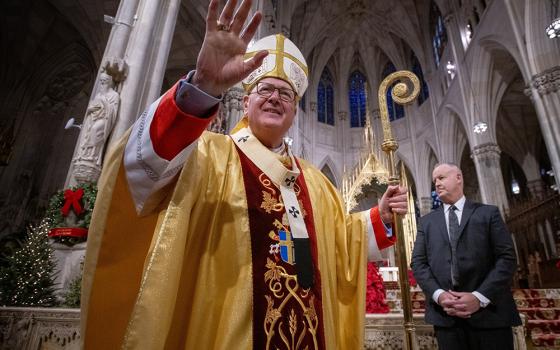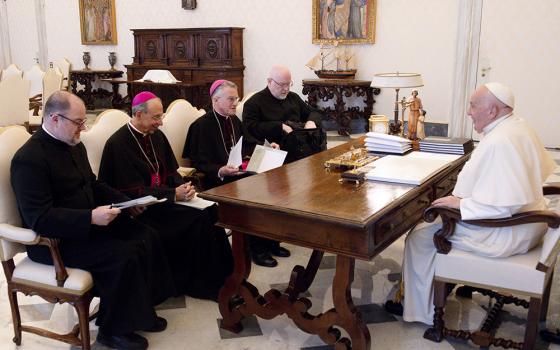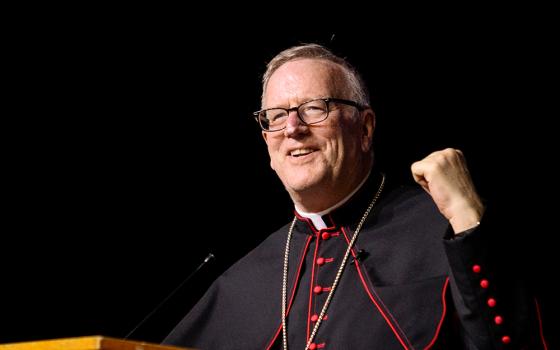
Pope Francis meets Anglican Archbishop Ian Ernest, the archbishop of Canterbury's representative in Rome, and Orthodox Metropolitan Polykarpos of Italy, the Ecumenical Patriarchate's representative in Rome, during an ecumenical evening prayer service marking the end of the Week of Prayer for Christian Unity at the Basilica of St. Paul Outside the Walls in Rome Jan. 25. (CNS/Vatican Media)
Just next to the Basilica of Sts. Celso and Giuliano — a popular spot for the traditional Latin Mass here in the Eternal City — is Ponte Sant'Angelo Methodist Church, an English language congregation that proudly boasts, "Everyone is welcome, whatever their background."
And on Jan. 21, the church gave lived expression to that when Xavière Sr. Nathalie Becquart, a No. 2 official at the Vatican's synod office, preached during its Sunday service.
Becquart's invitation to preach was part of a flurry of events taking place here in Rome this week during the annual Week of Prayer for Christian Unity, an octave-long celebration that's been taking place for over a century.
As the Rev. Matthew Laferty, director of the Methodist Ecumenical Office in Rome, explained to me, the congregation has a custom of inviting a preacher or preachers from non-Methodist Christian traditions to preach on the Sunday of the annual week dedicated to praying for Christian unity.
That may be tradition, but there was a novelty about it, too.
"It certainly would have been the first time that a high-ranking Vatican official, who is a woman, preached at Ponte Sant'Angelo," observed Laferty.
During her remarks, Becquart, a French sister, reflected on the Gospel passage of the good Samaritan.
Laferty recalled that Becquart reminded the congregation that the Gospel asks the question: "Who do we identify as our sister and brother?"
"In recognizing each other in our common baptism as Christians, and seeing the text from that perspective ... that leads us into the action of the good Samaritan," said Laferty, who said that Becquart's words served as a reminder that "the path of Christ is also the path of unity."
Across town, on the evening of Jan. 25, Pope Francis and the archbishop of Canterbury, Justin Welby, will preside over a prayer service commissioning a group of 50 Anglican and Catholic bishops to go out into the world to be witnesses of Christian unity.
The commissioning service will take place at the Papal Basilica of St. Paul Outside the Walls — not only the site of the tomb of the apostle Paul, but also the very location where on Jan. 25, 1959, Pope St. John XXIII announced that he intended to call an ecumenical council.
The pope's plans for the Second Vatican Council, which surprised the cardinals gathered that day at the chapter room of the Benedictine abbey attached to the basilica, set into motion what would later be recognized as a historic turning point in relations among Christians, where unity was identified as a top priority.
Slowly and steadily, that work has continued, literally moving from Rome onward.
'Visiting the mother churches of our two traditions is a beautiful thing to do together. Doing so in pairs also helps nurture personal friendships between the leaders.'
—Benedictine Fr. Martin Browne
While the Anglican and Catholic bishops have assembled first here this week from over 25 countries, they will then continue on pilgrimage together to England, on a trip that will culminate in a choral Eucharist at Canterbury Cathedral on Jan. 28, where Hong Kong Cardinal Stephen Chow will preach.
The gathering of the bishops has been organized by the International Anglican-Roman Catholic Commission for Unity and Mission (IARCCUM) to "give flesh and visible expression to what has been achieved in our theological dialogues," said Benedictine Fr. Martin Browne, who serves as an official at the Vatican's Dicastery for Christian Unity.
"Visiting the mother churches of our two traditions is a beautiful thing to do together. Doing so in pairs also helps nurture personal friendships between the leaders," Browne told me. "These friendships are key foundations for working together."
Along with the Anglicans and Methodists, other ecumenical initiatives have been ongoing during this week, including the Joint International Commission for Theological Dialogue Between the Catholic Church and the Oriental Orthodox Churches; the German Catholic and German Lutheran communities; and, the "Churches Together in Rome," a consortium of Protestant, Anglican and Catholic communities seeking to promote Christian unity.
"Our division is scandalous to us and the church, let alone to the world, particularly in light of Jesus' prayer that they all may be one," said Laferty. "The Week of Prayer for Christian Unity is an annual reminder and call for the church for visible unity."
Advertisement
Reflecting on the experience of the week thus far, Browne said that he had been personally moved by watching the bishops get to know each other.
"Some are already deeply involved in working together, some are just starting out on that journey. But their openness to each other and to the walking, praying and working together that IARCCUM seeks to encourage has been quite something to hear and has been hugely encouraging," he said.
"Morning prayer on the first day, when with minimal preparation and no organ or other accompaniment was a moving foretaste of this," Browne continued. "The bishops sang together, loudly and well! At its heart, that’s what this meeting is about."
At a meeting with ecumenical church leaders from Finland on Jan. 19 that helped kick off the week's activities, Francis received a pair of winter gloves from Bishop Bo-Göran Åstrand of the country's Evangelical Lutheran Church.
Åstrand went on to describe them as "a modest gift, to warm the pope’s hands in an otherwise cold world."
Even so, here in Rome this week, the annual Week of Prayer for Christian Unity is seeking to accelerate the thaw in ecumenical relations, so that those gloves might not be necessary.








